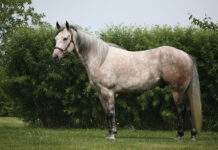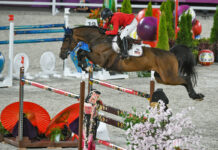Fall always makes me a little sad, as it means that
summer has ended and we’re moving into the dreary days of winter. It’s too bad,
because fall itself is a nice season with perfect temperatures for enjoying
long trail rides. The crisp air and smell of dried leaves always triggers the
memory of the first—and so far, only—time I tried fox hunting.
living with my parents and sort of drifting along, looking for a real job to
replace my seasonal riding instructor gig. I occasionally took jumping or
dressage lessons from an instructor who kindly let me work them off by cleaning
stalls. One November evening, I ran into my instructor at a bookstore. We
chatted for a bit, and she mentioned
that the student she was going to bring fox hunting the following day had
backed out, and asked if I’d like to come.
I was a little hesitant, but she assured me I could
ride with the hilltop group, which meant I wouldn’t have to test my non-existent
cross-country jumping skills. Because it was so late in the fox hunting season,
I knew the other riders would be more legged up than I was and it would
probably be a pretty long ride, but my instructor didn’t seem concerned.
“We’re a little old lady hunt,” she said.
“If you’ve been getting on Snoopy and trotting around for 10 minutes,
you’ll be fine.”
The next morning, my alarm went off at 4:30 and I
groggily dug out my hunt seat show clothes. They probably wouldn’t have gone
over well at a big hunt in Virginia, but for
the little old lady hunt in New Hampshire, they would suffice. I met my instructor at
the barn where we loaded up the horses and their tack and headed out.
 |
| Polly Sue, shown here at age 31, had no idea that horses are supposed to slow down in their old age. Photo: Leslie Potter |
My fearless mount for the day was Polly Sue, a
30-year-old (yes, really) Appaloosa who was a fantastic babysitter for riders
who, like me, lacked confidence over fences. She’d even carried me to a second
place finish in a big hunter class at a local show the previous summer, so I
figured we’d do fine together.
My instructor was serving as whipper-in, so I was
left with the hilltoppers and very little clue as to what was going to happen.
After the hounds took off, the first field followed at a dead gallop. The rest
of us followed at a slower pace.
I feel I should interrupt the story at this point
to ease anyone’s concerns about fox welfare. This particular hunt was a scent
drag, meaning one rider set off ahead of time and left a scent trail for the
hounds to follow. No foxes were harmed in the making of this hunt.
When my field set off, I was surprised to find how
strong Polly Sue was. She was always an energetic old girl, but her attitude on
the hunt field was, “You just sit there and stay out of my way. I know
what I’m doing.” Furthermore, we spent nearly all of our time either
trotting or galloping, which meant there was little time spent actually sitting
in the saddle.
By the champagne stop halfway through the hunt, my
legs were starting to feel a bit mushy. I passed on the mid-morning beverage
and soon enough, we were back on the field. Polly Sue still felt as if she
still had enough gas in the tank to finish the 100-mile Tevis Cup, and I found
myself struggling to keep her from passing the field master. My legs were
crying and I resorted to bridging my reins and leaning on the mare’s withers to
give my legs some relief. When I looked around, the “little old
ladies” in the field all looked invigorated and happy while 22-year-old me
was ready to collapse and let Polly Sue finish on her own.
It was humbling.
The next morning, I woke up early to go take some
photos of my instructor’s stallion as a thank you for bringing me along on the
hunt. My legs refused to respond to the cues my brain was giving them. It took
me about ten minutes to get down a single flight of stairs. When I finally
reached the bottom, my mother looked up from the newspaper.
“Where were you yesterday?” she asked.
“Fox hunting,” I said.
“Fox hunting?”
“Yeah, you know. Horses, hounds, ‘Tally ho!’
Fox hunting.”
She looked at me blankly. “But, this isn’t England.”
Did I mention my parents aren’t horse people?
In spite of the pain and suffering it inflicted
upon my legs, I enjoyed going on the hunt and would love to do it again
someday. Lesson learned, however: I will make sure to practice riding in
two-point, posting without stirrups and doing squats for weeks ahead of time to
prepare. I don’t need to get shown up by the little old ladies more than once
in my life.
Back to The Near Side






You mention the Trevis Cup, did you know that W.R.Brown of the Maynesboro Stud, right here in Berlin,NH began the Endurance Testing for such rides back in 1913? In 1918, NH became the testing ground for the US Remount program over many miles of NH Forests and lands. Having founded the Society for the Protection of NH Forests as well as NH Timber Owners Association, the NH Equine industry owes much to this man that 100 years ago saw the value of saddle stock on open land; unfortunately, this past week the US Forest Service did NOT include equine(stock) as a recognized user of much of the US Public land, with the passage of this bill: http://www.fs.fed.us/news/2011/releases/10/community.shtml
I am in hopes that private landowners will continue to allow equine (stock) access.
This is a BIG DEAL for Land, Trail and Foxhunters alike.
If anyone would like to further their education on such issues here in NH and beyond, contact me-